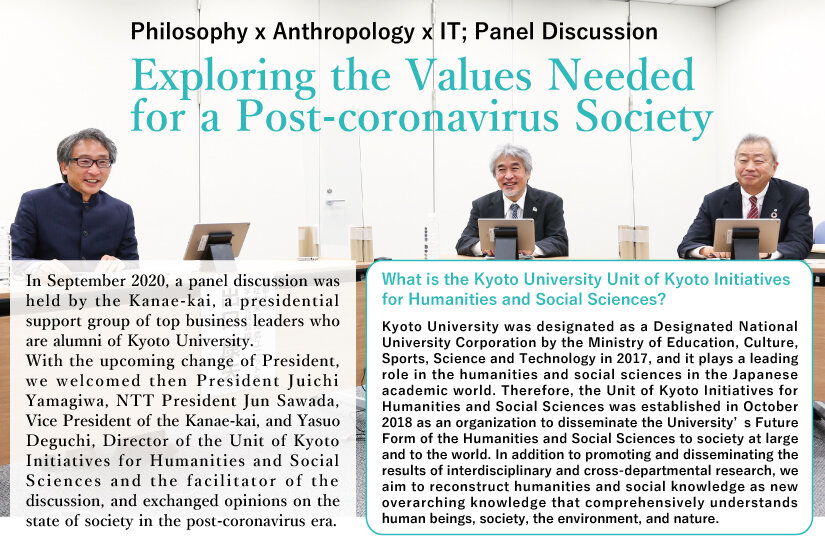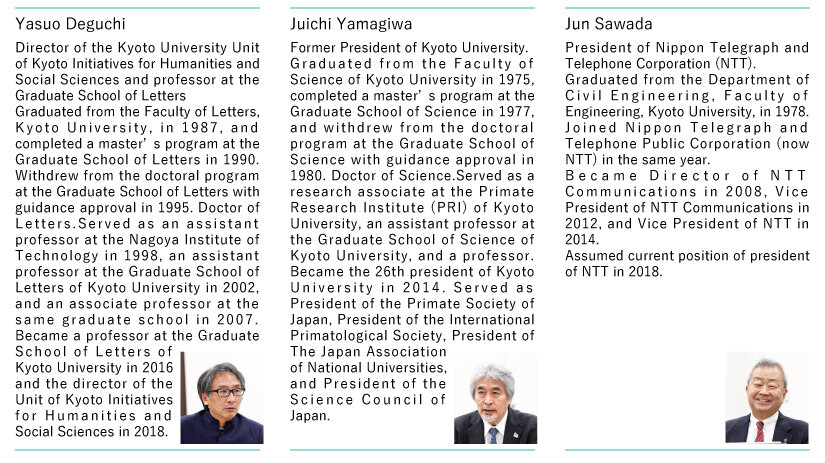Vol.18 Panel Discussion


What are the values required in the post-coronavirus era?
Deguchi Already 40 years ago, the French philosopher Lyotard pointed out the "unitary dominance of efficiency" as a dystopia (anti-idealism) of the advanced information society, and he said that what he feared was that efficiency itself would become self-objective and the "for what" part would be lost.
Our ancestors believed that the root cause of war and other social problems was ignorance and poverty. They believed that a brighter future would open up if we enriched the world through the spread of education and the development of science, and they set that as their goal. In pursuit of efficiency, we have promoted the mobility of people, goods, and money and globalization.
In reality, many problems cannot be solved by just promoting the mobility of people, goods, and money and globalization, and globalization in the pre-coronavirus world has gone as far as it can go. It may have been the ultimate form of dystopia stated by Lyotard.
However, in the midst of the coronavirus pandemic, now is the time to reconsider whether we should return to our original globalization and explore new values. From this perspective, I would like to hear the opinions of the two of you on the values needed in the post-coronavirus era and the direction of the reboot of society.
Sawada Today, with the advancement of AI and IoT, we can create a comfortable environment, but it is also inextricably linked to being monitored and controlled. If the digital twin accelerates, centralized control will prevail in everything. How to control IT, which is advancing at a tremendous speed, will be important in the future, and that is why we are launching a project with Professor Deguchi to create a new world view where the evolution of technology and people are in harmony.
At present, people and goods are not moving due to the coronavirus, but money is moving, so there will be a major structural change in the future. I realize that we are already beginning to see the simultaneous parallelism of the parts that work locally and the parts that work globally.
Yamagiwa In Tadao Umesao's book titled Chitekiseisan no Gijyutsu (The Art of Intellectual Production), which I read when I was a student, Mr. Umesao predicted the modern information age and wrote that an age would come when information would have value and generate money.
The scary thing about the information society is that at first it will help develop society, but it may turn out to be a negative thing as people start to use it in the wrong way. Information is easy to manipulate, and now that everyone is a sender, it is hard to tell what has credibility and what is backed up by evidence.
What happened at the height of globalization was that what was discussed on the world platform began to feel like it was being imposed on the region. The SDGs are a global agreement to work together to achieve the 17 goals, but strangely enough, there is no culture in the discussion. Culture cannot be global. It is a local thing that is closely tied to the land.
In the past, we said "Think global act local," but from now on, I think it is more like "Think local act global." I think that after the coronavirus pandemic, it will be possible to reorganize society in such a way that the big things will not absorb the small things and that the cultures of various regions, while separated, will create a network and increase cooperation.
Charting the future of online learning without losing individuality
Deguchi Having proper localization allows for an independent value system, economy, and information flow, which importantly leads to globalization.
Today's other topic, "online learning," is a serious issue. Each person's sense of value comes into play in determining what can be remotely controlled and what cannot.
Yamagiwa The reason I said that local is important is because I believe that we should rethink our individuality.
Kyoto University's education has traditionally valued individuality, but there is a fear that relying on distance learning will lead to uniformity. The way to avoid this is to give private lessons even online and take care of the problems and questions that individuals have. Face-to-face classes are not just about exchanging information but about entering into, embodying, and feeling each person's heart. This is important in education, especially in practical training, exercises, and fieldwork, and it is a shame that we are deprived of such classes.
Sawada The potential of IT is that it can provide personal solutions for individuals. Cyberspace is infinite, and the search for efficiency will lead to uniformity, but by increasing the value of the individual, we can create endless variations. It is important to have a good combination of both.
I do not think it is a good idea to think of online learning in dualistic terms. IT should be used as a tool in education. However, in terms of the embodiment of information, we have only achieved visual and auditory communication, not five-sense communication. It is impossible to do everything online if you cannot convey a sense of reality.
Deguchi Face-to-face communication is in contrast to online learning. Communication that includes physical sensation is desperately needed.
What we do not have in online learning is sneaking around and exposing our bodies. When we step into each other's reach by facing one another, we are indicating to each other, "I am safe." We are peacefully overcoming the risks of face-to-face interaction. On the other hand, we have acquired over the years the communication skills to let the other person know that we are telling only him/her a secret. I think this is a uniquely human trait.
Yamagiwa Gorillas do not have words, so instead they use their bodies and create relationships by being close to each other. On the other hand, humans use not only their bodies but also words to build trust and create friendships. In fact, there is a hypothesis that says the majority of human conversation is gossip and that the purpose is to build relationships rather than to exchange reliable information. "Good morning" and "good evening" are a social language of sharing time that does not convey meaning, but rather confirms a relationship with the other person. As a means of flexibly connecting with others, humans have evolved communication that emphasizes relationships rather than meaning.
Deguchi Each country dealt with the coronavirus, a scientific proposition, very differently, and the differences in national character and values really showed.
There is not much difference in information and infrastructure, but the fact that countries are so different may mean that there is a limit to what a single platform can do. I think the coronavirus has made it clear that the nature of informatization itself differs from country to country.
Sawada NTT is trying to do things differently than GAFA. NTT will use information locally so that trust can be established with citizens, who are the owners of information. It is natural that different areas have different models, and it is necessary to think of global norms and local action. NTT, including its overseas subsidiaries, had more than 1,000 cases of coronavirus infections, but we stopped trying to come up with a common solution and asked each area to deal with infections in their own way. I think we are living in an age where global norms, which are necessary for diversity, are required.
Deguchi Kyoto University is a rare example in Asia because it exists as a world-class research university in a place that is not the capital. Against the backdrop of Kyoto's non-standardized culture, the city and the University have worked in unison to foster an interesting spirit.
In a situation where the coronavirus is causing problems for various places and people, it will be important to see how we can demonstrate the value of Kyoto University in the future.
Yamagiwa Kyoto is a very fascinating place with a long history of 1,200 years, where cultures have been connected through the ages. Kyoto University, located in Kyoto, has a special place in the hearts of its citizens. If Kyoto University takes action, the city and citizens will follow suit. Kyoto University should exert its power in the post-coronavirus era as a glocal entity.
In conclusion-----------------------------------------------------------------------------------------------------------------------------------
From Juichi Yamagiwa, 26th President
The WINDOW concept that I put forth was to raise students to be strong and send them out the window, and I believe that thanks to everyone, we have been able to achieve the concept to some extent. I myself am now about to float out of the window as a WIND. From here on, President Minato, please take the lead.
From the 27th President Nagahiro Minato
The changes taking place are not all related to the coronavirus, but national universities are entering a new phase. For whom does Kyoto University exist? I hope that many people will participate in this discussion to explore the origin of this question and give us suggestions.
(Held in September 2020)

